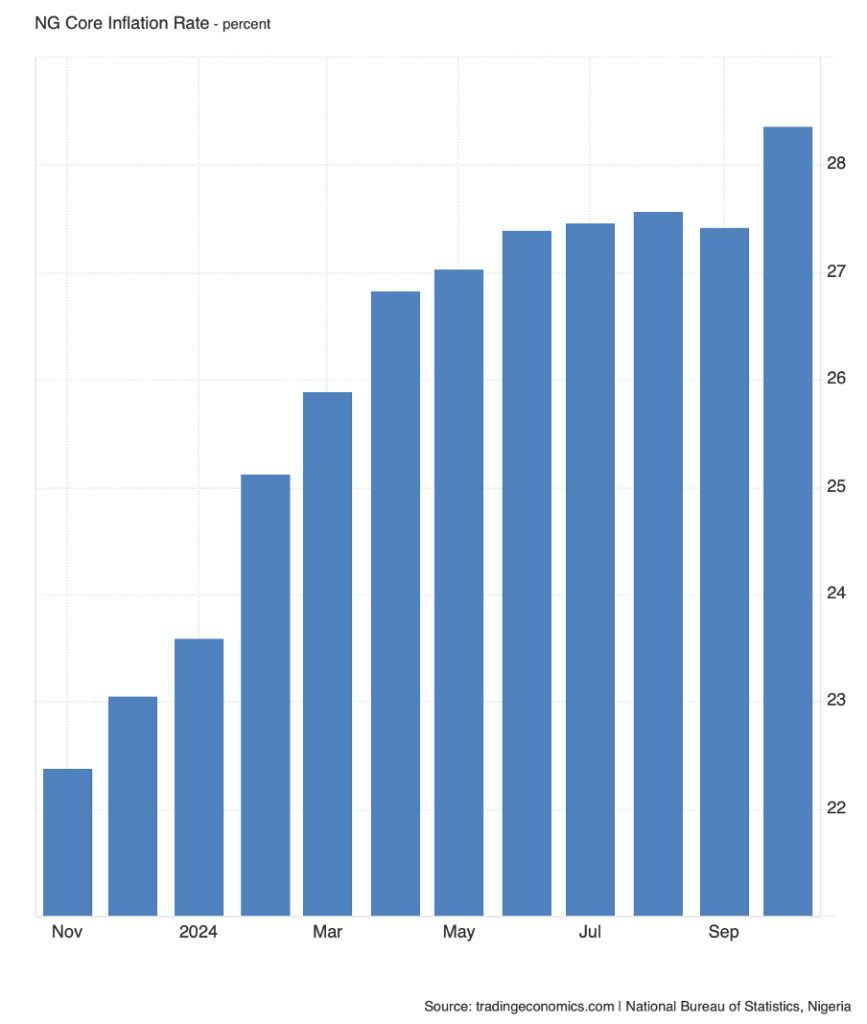Inflation in Nigeria, currently reported at 33.88% as of October 2024, is reshaping the economy in profound ways, affecting every facet of daily life, including the entertainment industry. Lagos, often referred to as the cultural heartbeat of Nigeria, is renowned for its dynamic music and events scene. However, the impact of inflation has pushed concert ticket prices to unprecedented heights, changing the way both consumers and organizers engage with live entertainment.

Economic Factors Driving Inflation
Nigeria’s inflation crisis stems from several interlinked factors, including the removal of fuel subsidies, a depreciating naira, and global economic pressures. Transportation costs have skyrocketed, with fuel prices more than tripling in the last year. The removal of subsidies—although intended to stabilize government finances—has caused a ripple effect, driving up the cost of goods and services. Meanwhile, the naira’s depreciation has made imports, including the technical equipment needed for large-scale concerts, significantly more expensive.
This economic backdrop has left Nigerian households with less disposable income. A greater portion of earnings is now directed toward essentials such as food, housing, and transportation, leaving little room for discretionary spending like concert attendance.
Rising Concert Costs: A Breakdown
Lagos, home to a bustling music industry and a frequent stop for international artists, has seen production costs for concerts rise sharply. Venue rental fees, transportation logistics, lighting, sound equipment, and artist fees have all become more expensive. Many of these expenses are tied to the dollar, compounding the financial challenges faced by event organizers.

The result is a dramatic increase in ticket prices. Where a standard ticket to a concert might have cost ₦10,000 in 2020, current prices for similar events often exceed ₦50,000, with premium seating surpassing ₦150,000. This surge reflects not just inflation but also the higher stakes for organizers, who must recover significantly elevated costs while still drawing crowds.
The Consumer Perspective
For many Lagosians, concerts have long been a communal experience—a chance to connect with artists and celebrate culture. However, the escalating cost of tickets is reshaping consumer behaviour. Fans are now more selective about the events they attend, often choosing one or two major concerts over the course of a year rather than attending multiple events.

Additionally, middle-class audiences, who previously formed the bulk of concertgoers, are being priced out of high-profile events. This has led to the rise of alternative entertainment options, such as smaller shows, open-mic nights, or even digital concerts, which provide more affordable ways to enjoy live music.
Challenges for Event Organizers
Organizing concerts in this economic climate is a balancing act. On the one hand, there is sustained demand for live music, particularly during the festive December period, when Lagos transforms into a hotspot for entertainment. On the other hand, the high cost of production limits the ability of organizers to set affordable ticket prices.
Corporate sponsorships have become a crucial lifeline for many events, helping to offset costs and keep tickets moderately priced. Sponsorship deals often include extensive branding and marketing collaborations, which can enhance the overall concert experience for fans. However, securing these partnerships remains competitive and heavily reliant on the perceived marketability of the event and its performers.
The Broader Implications
The inflationary pressures affecting Lagos’s concert scene reflect broader systemic challenges within Nigeria’s economy. The entertainment industry, much like other sectors, is grappling with the high cost of doing business and the lack of supportive infrastructure. This raises questions about the sustainability of current pricing models and the accessibility of cultural experiences for the average Nigerian.
For artists, particularly local talents, these economic conditions pose additional hurdles. Rising costs make it harder for up-and-coming performers to break into the scene, as smaller venues struggle to stay profitable and large-scale events prioritize well-established acts who can guarantee ticket sales.
A Path Forward
Despite these challenges, there are opportunities for innovation. Organizers could explore more diverse pricing structures, such as tiered ticketing that offers affordable options for larger audiences. Collaborative efforts between industry stakeholders could help reduce costs, whether by pooling resources for shared equipment or lobbying for government incentives to support the entertainment sector.
Additionally, greater emphasis on local talent could help cut costs associated with international acts. Promoting homegrown stars not only reduces dependency on foreign currency but also strengthens the cultural identity of Lagos’s entertainment scene.
A Call to Action
The rising cost of concert tickets in Lagos highlights the need for systemic reforms in both the entertainment industry and the broader economy. Addressing inflation requires coordinated efforts to stabilize naira, control fuel prices, and create an enabling environment for businesses to thrive.
For the entertainment sector, the focus should be on creating sustainable models that prioritize accessibility without sacrificing quality. By doing so, Lagos can maintain its reputation as a global cultural hub while ensuring that live music remains a source of joy and unity for all Nigerians.
Inflation may be an unavoidable reality for now, but the spirit of Lagos—the energy, creativity, and resilience that define its people—remains a powerful force. It is this spirit that will ultimately guide the city through these challenges, ensuring that its vibrant music scene continues to thrive.
We are so excited that you joined our community. We will guide you through life-changing events and stories. Do not forget to send us an email about the partnership. Find other related articles on our website and follow us on Instagram @InsideSuccessNigeria for more updates.



Leave a Reply